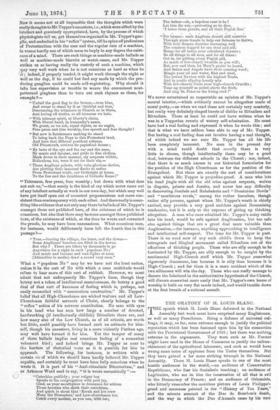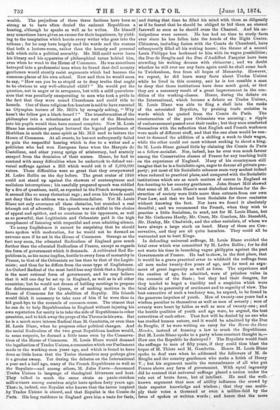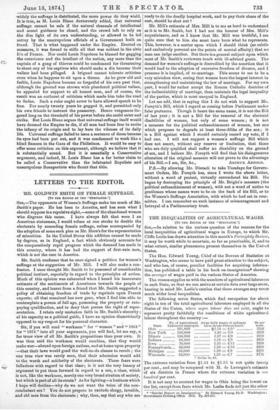THE ORATORY OF M. LOUIS BLANC.
THE speech Which M. Louis Blanc delivered in the National Assembly last week must have surprised many Englishmen, as well as many Frenchmen. Being a defence of universal suf- frage, it may, so far, seem extreme enough to justify the political reputation which has been fastened upon him by his connection with the Provisional Government of 1848; but there was nothing.. extreme in the arguments. They were such as Mr. Forster might have used in the House of Commons to justify the enfran- chisement of the agricultural labourers, and such as would have wrung some notes of applause from the Tories themselves. But they have gained a far more striking triumph in the National Assembly. There M. Louis Blanc speaks to one of the most hostile audiences in the world,—an audience of Conservative Republicans, who fear his Socialistic teaching ; an audience of Legitimists, who see in him the incarnation of all that is evil in the Democracy of France ; and an audience of Orleanists, who bitterly remember the merciless picture of Louis Philippe's greed and meanness painted in the "History of Ten Years," and the minute account of the Due de Bourbon's death, and the way in which the Dm d'Aumale came by his vast wealth. The prejudices of these three factions have been so strong as to have often denied the eminent Republican a bearing, although he speaks as well as he writes. He himself may sometimes have given an excuse for their impatience, by yield- ing to the temptation which besets every writer who goes into the tribune ; for he may have largely used the words and the reasons that befit a lecture-room, rather than the homely and personal talk which suits a political assembly. Mr. Mill could never leave his library and his apparatus of philosophical terms behind him, even when he went to the House of Commons. He was sometimes betrayed into a professorial tone when he found that dull country gentlemen would stoutly resist arguments which had become the common-places of his own school. Now and then he would seem to say, "How can you be so stupid as to deny truths that ought to be obvious to any well-educated child?" He would put the question, not in anger or in arrogance, but with a mild querulous- ness that was peculiarly exasperating to men who took a pride in the fact that they were sound Churchmen and could ride to hounds. One of these religious fox-hunters is said to have resented an Olympian lecture of Mr. Mill's by savagely asking, " Why hasn't the fellow got a black-board ? " The transformation of the philosopher into a schoolmaster and the rest of the Members into his pupils would then have seemed complete. Now M. Louis Blanc has sometimes perhaps lectured the bigoted gentlemen of Morbihan in much the same spirit as Mr. Mill used to lecture the House of Commons. At all events, he has not unfrequently failed to gain the respectful hearing which is due to a writer and a politician who had won European fame when the Marquis de Castellane, and other young sprigs of aristocracy, had scarcely escaped from the dominion of their nurses. Hence, he had to contend with many difficulties when he undertook to defend uni- versal suffrage against a Bill which would rob it of 3,000,000 voters. Those difficulties were so great that they overpowered M. Ledru Rollin on the day before. The great orator of 1848 could not stand up against the showers of contemptuous and malicious interruptions ; his carefully prepared speech was riddled by a fire of questions, until, as reported in the French newspapers, it seemed like so many rhetorical rags ; and even his friends could not deny that the address was a disastrous failure. Yet M. Louis Blanc not only overcame all these obstacles, but snatched a real triumph out of adversity. His speech was so skilful in the choice of appeal and epithet, and so courteous to his opponents, as well as so powerful, that Legitimists and Orleanists paid it the high compliment of listening with respectful and even admiring silence.
To many Englishmen it cannot be surprising that he should have spoken with moderation, for he would not be deemed an extreme man if he sat in the House of Commons. Strange as the fact may seem, the educated Radicalism of England goes much further than the educated Radicalism of France, except as regards the form of government which it demands. A cultivated Red Re- publican is, as his name implies, hostile to every form of monarchy in France, to that of the Orleanists no less than to that of the Legiti- mists; and thus far he differs from the same type of Englishmen. An Oxford Radical of the most lurid hue may think that a Republic is the most rational form of government, and he may believe that it will one day be set up in England, as well as in all other countries; but he would not dream of holding meetings to propose the dethronement of the Queen, or of making motions in the House of Commons for the abolition of Royalty. His friends would think it necessary to take care of him if he were thus to bid good-bye to the counsels of common-sense. The utmost that he can do to help Republicanism in England without injuring his own reputation for sanity is to take the side of Republicans in other countries, and to kick away the props of the Throne in his own. But he is a much more intense Radical than M. Gambetta, or even than M. Louis Blanc, when he proposes other political changes. And the social Radicalism of the two great Republican leaders would, in some respects, be deemed a little tame even by the Conserva- tives of the House of Commons. M. Louis Blanc would demand the legalisation of Trades Unions, a concession which our Parliament made to the working-men years ago, and which is found to have done so little harm that the Tories themselves may perhaps give it a greater sweep. Yet during the debates on the International a year and a half ago, many of the French Republicans as well as the Royalists—and among others, M. Jules Favre—denounced Trades Unions in language of theological bitterness and heat. They talked in much the same strain as panic-stricken mill-owners among ourselves might have spoken forty years ago. Thera is, indeed, one Royalist who knows that the terror inspired by Trades Unions is absurd, and that Royalist is the Conite de Paris. His long residence in England gave him a taste for facts,
and during that time he filled his mind with them as diligently as if he feared that he should be obliged to bid them an eternal
farewell so soon as he should cross the Channel. And his an-
ticipations were correct. He has had no time to study 'facts ever since he has fallen into the hands of the Right Centre.
Chimaeras, including fusion with the Comte de Chambord, have subsequently filled all his waking hours ; the throne of a second Louis Philippe has beckoned to him with its vague possibilities;
the Due de Broglie and the Dec d'Audiffret Pasquier have been crowding his waking dreams with chimeras; and we doubt whether he will ever see any facts again until he shall come back to Twickenham, free from all hopes of Monarchy. However,. we repeat, he did learn many facts about Trades Unions while he lived in this country, and he is too sensible a man to deny that those institutions have done much good, or that they are a necessary result of a great improvement in the con- dition of the working-classes. Hence, during the debate on the International, which became a debate on Trades Unions, M. Louis Blanc was able to fling a shell into the ranks of the astonished Royalists, by praising trade societies in words which he quoted from the Comte de Paris. The consternation of the poor Orleanists was amusing ; a ripple of embarrassment passed over their ranks ; but they soon comforted themselves with the reflection that English and French workmen were made of different stuff, and that the one class would be con- tent to demand the addition of a shilling a week to their wages, while the other could not meet without seeking to shoot a king. So M. Louis Blanc gained little by claiming the Comte de Paris as a fellow-socialist. Nor, indeed, has he ever won much favour among the Conservative classes of France for any teaching built on the experience of England. Many of his countrymen still imagine that he is a Socialistic ogre, eager to devour all private pro- perty; yet most of his Socialistic schemes seem very modest indeed when reduced to practical plans, and compared with the Socialistic institutions which are as much matters of course in England as fox-hunting to her country gentlemen. John Stuart Mill showed that some of M. Louis Blanc's most diabolical devices for the de- struction of society were little more than extracts from our own Poor Law, and that we had been Socialists for three centuries without knowing the fact. Nor have we found it absolutely dreadful ; and we recommend the French, when they wish to practise a little Socialism, to send, not for M. Louis Blanc, but for Mr. Gathorne Hardy, Mr. Cross, Mr. Goschen, Mr. Stansfeld, Mr. IIenley, Mr. Chadwick, and the other socialists, of whom we have always a large stock on hand. Many of them are Con- servative, and they are all quite harmless. They could all be warranted not to hurt Kings.
In defending universal suffrage, M. Louis Blanc avoided the fatal error which was committed by M. Ledru Rollin ; for he did not waste his time in launching vague philippics against the past Governments of France. He had to show, in the first place, that it would be a grave practical error to withhold the suffrage from all men under twenty-five years of age, and he used an argu- ment of great ingenuity as well as force. The experience and the caution of age, he admitted, were of priceless value in the counsels of the State ; but they had their dangers, for they tended to beget a timidity and a suspicion which were fatal alike to generosity of sentiment and to sagacity of view. The best corrective of such a tendency was, he argued, to be found in the generous impulses of youth. Men of twenty-one years had a wisdom peculiar to themselves as well as men of seventy ; men of seventy were beset by follies as well as men of twenty-one ; and the hostile qualities of youth and age were, he argued, the best correctives of each other. That fact will be denied by no one who has studied human nature, and it would be admitted by the Duc de Broglie, if he were writing an essay for the Revue des Deux Mondes, instead of framing a law to crush the Republicans. But M. Louis Blanc spoke to a party whose constant thought is,— How can the Republic be destroyed ? The Royalists would limit the suffrage to men of fifty years, if they could thus blast the hopes of M. Thiers and M. Gambetta. Hence M. Louis Blanc spoke to deaf ears when he addressed the followers of M. de Broglie and the country gentlemen who make a fetish of Henry V.; but his argument merits the remembrance of all who put France above any form of government. With equal ingenuity did he contend that universal suffrage placed a nation under the rule not of brute force, but of intellect. He used the well- - known argument that men of ability influence the crowd by their superior knowledge and wisdom ; that they can multi- ply their votes a thousand or even a million-fold by the force of spoken or written words ; and hence that the more
'widely the suffrage is distributed, the more power do they wield. It is true, as M. Louis Blanc dexterously added, that universal suffrage cannot be safe if the natural channels of intellectual and moral guidance be closed, and the crowd left to rely on the dim light of its own understanding, or allowed to be led astray by the unscrupulous officials of a Government built on fraud. That is what happened under the Empire. Erected on massacre, it was forced to stifle all that was noblest in the civic life of France. Nor could Louis Napoleon be blamed for gagging the conscience and the intellect of the nation, any more than the captain of a gang of thieves could be condemned for threatening to shoot any of his captives who should make a din because their valises had been pillaged. A brigand cannot tolerate criticism even when he happens to sit upon a throne. As he grew old and feeble, Louis Napoleon became so forgetful of his own past that, although the ground was strewn with plundered political valises, lie appealed for support to all honest men, and of course, the result was an outburst of criticism which made him take the road to Sedan. Such a ruler ought never to have allowed speech to be free. For nearly twenty years he gagged it, and permitted only his own friends to instruct the peasantry. Hence vengeance lin- gered long on the threshold of his power before she could enter and strike. But Louis Blanc argues that universal suffrage itself would have doomed the Empire to die, if all men had been free to recite the infamy of its origin and to lay bare the vileness of its daily life. Universal suffrage failed to issue a sentence of doom because its eyes had been put out, and it was condemned to work like a blind Samson in the Gaza of the Philistines. It would be easy to offer some criticism on this argument, although we believe that it is substantially sound. But it is essentially a Conservative argument, and indeed, M. Louis Blanc has a far better claim to be called a Conservative than the infatuated Royalists and unscrupulous Bonapartists who flaunt that title.




































 Previous page
Previous page